Preschool lesson plans are structured guides that outline activities and learning objectives for young children‚ ensuring a balanced approach to academic‚ social‚ and emotional development․
Importance of Preschool Lesson Plans
Preschool lesson plans are essential for creating a structured and engaging learning environment․ They ensure young children develop foundational skills‚ fostering academic‚ social‚ and emotional growth․ By providing clear objectives and activities‚ these plans help teachers stay organized and focused‚ ensuring consistency in instruction․ Lesson plans also support developmental milestones‚ allowing educators to cater to diverse learning needs․ They promote intentional teaching‚ ensuring that play and learning are purposeful․ Effective plans adapt to children’s interests and abilities‚ making learning meaningful and enjoyable․ Ultimately‚ they lay the groundwork for future success‚ helping children transition smoothly to higher levels of education․
Benefits of Using Preschool Lesson Plans
Preschool lesson plans offer numerous benefits‚ including enhanced structure and organization in the classroom․ They ensure that learning objectives are met through engaging activities tailored to diverse learning styles․ By incorporating play-based learning‚ lesson plans promote creativity‚ critical thinking‚ and social interaction․ They also facilitate effective time management‚ allowing teachers to cover essential skills and topics․ Additionally‚ lesson plans provide a clear roadmap for assessments‚ helping educators track children’s progress․ They foster a balanced approach to education‚ combining academic preparation with emotional and psychological growth․ Ultimately‚ well-designed lesson plans make learning fun and interactive‚ benefiting both teachers and young learners alike․
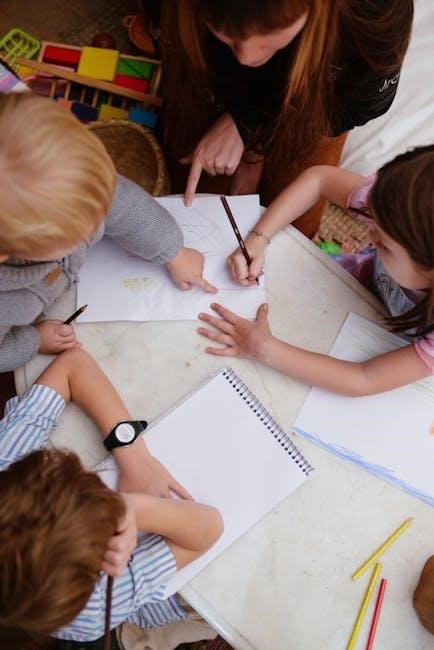
Understanding the Components of a Preschool Lesson Plan
A preschool lesson plan typically includes objectives‚ materials‚ activities‚ and assessments․ It outlines the structure‚ duration‚ and engagement strategies for each session‚ ensuring a comprehensive learning experience․
Objectives and Learning Goals
Clear objectives and learning goals are essential in preschool lesson plans․ They define what children should achieve‚ ensuring activities are purposeful and aligned with developmental milestones․ These goals are specific‚ measurable‚ and achievable‚ focusing on social‚ emotional‚ and cognitive skills․ For example‚ objectives might include sharing toys‚ identifying shapes‚ or demonstrating curiosity․ Learning goals guide teachers in designing engaging activities‚ such as storytelling or art projects‚ that promote skill development․ Aligning objectives with children’s needs ensures a structured yet flexible approach‚ fostering growth and preparing them for future academic success․ Effective goals also encourage creativity and critical thinking‚ laying a strong foundation for lifelong learning․
Materials and Resources Needed
Preschool lesson plans require specific materials and resources to ensure engaging and effective learning experiences․ These may include art supplies like crayons‚ paints‚ and paper‚ educational toys such as blocks and puzzles‚ and books that align with the lesson’s theme; Additionally‚ sensory materials like sand‚ water‚ and play dough are often incorporated to promote tactile learning․ Technology tools‚ such as tablets with educational apps‚ can also be used to enhance lessons․ Teachers should prepare these resources in advance to support hands-on activities and ensure smooth transitions between tasks․ Having the right materials helps create a stimulating environment that fosters creativity‚ exploration‚ and skill development in young learners․
Structure of a Lesson Plan
A well-structured preschool lesson plan typically includes a clear timeline‚ learning objectives‚ and a sequence of activities․ It begins with an introduction to engage students‚ followed by hands-on activities that align with the learning goals․ Transitions between tasks are planned to maintain flow and minimize disruptions․ The lesson concludes with a review or reflection to reinforce what was learned․ Assessment methods‚ such as observation or simple exercises‚ are often integrated to monitor progress․ The structure ensures that activities are age-appropriate‚ engaging‚ and tailored to the developmental needs of preschoolers‚ while also allowing flexibility to adapt to their interests and energy levels․
Differentiation for Diverse Learners
Differentiation in preschool lesson plans involves tailoring activities to meet the unique needs of each child․ This approach recognizes that children have varying abilities‚ learning styles‚ and interests․ Teachers can adapt activities by adjusting complexity‚ incorporating visual aids‚ or offering hands-on tasks for tactile learners․ Grouping children by skill levels or interests allows for more focused instruction․ Additionally‚ incorporating diverse materials and cultural elements ensures inclusivity․ By differentiating instruction‚ teachers create an environment where every child feels supported and challenged‚ fostering individual growth and confidence․ This strategy is particularly effective in preschool‚ where developmental differences are significant‚ and personalized learning is key to early success․ Consistent differentiation helps teachers address these varied needs effectively‚ ensuring all learners thrive;
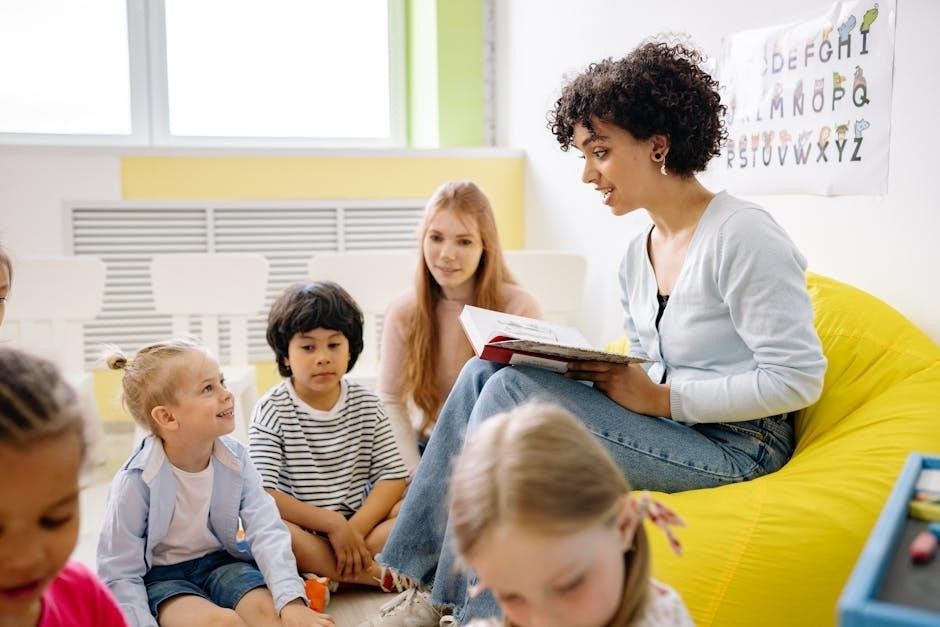
Key Elements of a Preschool Lesson Plan
A preschool lesson plan includes clear objectives‚ engaging activities‚ and assessments to monitor progress‚ ensuring a structured yet flexible approach to early childhood education and development․
Learning Objectives
Learning objectives in preschool lesson plans are specific‚ measurable goals that outline what children are expected to achieve․ They focus on cognitive‚ social‚ emotional‚ and physical development‚ providing clear direction for activities and assessments․ Objectives are tailored to align with developmental milestones‚ ensuring age-appropriate challenges․ For example‚ a literacy objective might involve recognizing letters‚ while a social objective could focus on sharing or cooperation․ By setting clear goals‚ teachers can track progress and adapt instruction to meet individual needs‚ fostering a supportive and effective learning environment․ Well-defined objectives ensure that lessons are purposeful and contribute to a child’s overall growth and readiness for future education․
Activity Plan
An activity plan in a preschool lesson plan outlines the specific tasks and experiences designed to engage children and promote learning․ These activities are often hands-on‚ play-based‚ and tailored to developmental levels․ They might include art projects‚ storytelling‚ science experiments‚ or group games‚ all aligned with learning objectives․ The plan also details how transitions between activities will be managed to maintain focus and minimize disruptions․ By incorporating diverse and interactive experiences‚ the activity plan ensures that children stay engaged while developing essential skills․ It serves as a roadmap for teachers to create meaningful and enjoyable learning experiences that cater to different learning styles and interests․
Assessment Methods
Assessment methods in preschool lesson plans are designed to evaluate children’s progress and understanding in a non-threatening way․ These methods often include observations‚ checklists‚ and informal evaluations during play-based activities․ Teachers may use portfolios to collect samples of a child’s work over time‚ showcasing their developmental milestones․ Simple quizzes or one-on-one interactions can also be used to assess knowledge retention․ The goal of these assessments is to identify strengths‚ areas for improvement‚ and individual learning styles․ By continuously monitoring progress‚ educators can adjust lesson plans to better meet the needs of their students and ensure a supportive learning environment․
Transition Strategies
Transition strategies are essential for maintaining structure and reducing disruptions in preschool classrooms․ Techniques like singing transition songs‚ using visual timers‚ or incorporating movement activities help guide children smoothly between tasks․ These methods prepare students mentally and emotionally for changes‚ fostering a sense of routine and predictability․ By implementing clear and consistent transition practices‚ educators can minimize chaos and ensure a calm environment․ These strategies also teach children self-regulation skills‚ helping them adapt to changes more effectively․ Effective transitions keep the flow of the lesson plan intact‚ allowing for a more productive and engaging learning experience for young learners․
Homework or Extended Learning
Homework or extended learning activities for preschoolers should be simple‚ engaging‚ and age-appropriate․ These activities extend classroom learning into the home‚ reinforcing skills like alphabet recognition‚ color matching‚ and counting․ Examples include puzzles‚ coloring sheets‚ or reading together with parents․ such tasks encourage parental involvement‚ fostering a deeper connection between home and school․ They also promote a love for learning and help children develop independence․ Extended learning should align with classroom objectives‚ ensuring consistency and continuity․ Activities should be brief‚ fun‚ and tailored to a child’s attention span‚ avoiding frustration․ This approach supports overall development while keeping young learners excited about education․
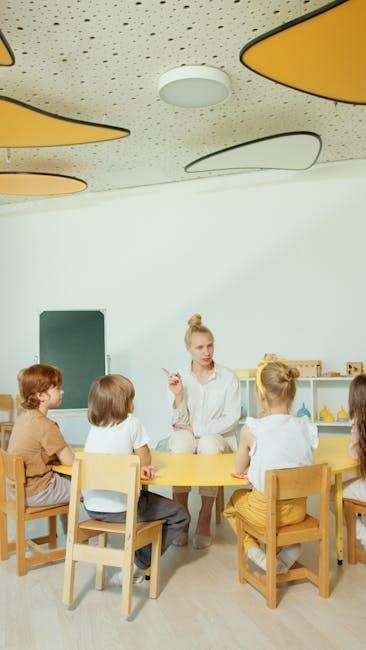
Benefits of Preschool Lesson Plans
Preschool lesson plans support overall child development‚ enhance academic preparation‚ and foster social-emotional growth‚ ensuring young learners are well-equipped for future educational challenges and lifelong success․
Enhanced Social Skills
Preschool lesson plans emphasize activities that promote interaction‚ sharing‚ and cooperation among children․ These structured experiences help develop essential social skills‚ such as communication‚ empathy‚ and conflict resolution․ Through group work and collaborative play‚ children learn to express their feelings‚ listen to others‚ and build friendships․ Lesson plans often include role-playing‚ storytelling‚ and community-themed activities that encourage teamwork and mutual respect․ By fostering a supportive environment‚ teachers help children navigate social challenges and develop confidence in their interactions․ These skills are crucial for forming positive relationships and thriving in educational and social settings throughout their lives․ Effective lesson plans ensure social growth is prioritized alongside academic development․
Emotional and Psychological Growth
Preschool lesson plans play a vital role in fostering emotional and psychological growth in young children․ Activities are designed to help children recognize‚ understand‚ and manage their emotions․ Through storytelling‚ art‚ and role-playing‚ kids develop self-awareness and self-regulation skills․ Lesson plans often incorporate mindfulness exercises and positive reinforcement to build resilience and confidence․ Teachers encourage open discussions about feelings‚ teaching empathy and understanding․ These practices help children develop a strong emotional foundation‚ essential for healthy relationships and lifelong mental well-being․ By integrating emotional intelligence into daily routines‚ preschool lesson plans support the holistic development of each child‚ preparing them for future challenges and successes․
Academic Preparation
Preschool lesson plans are instrumental in laying the groundwork for future academic success․ They introduce foundational skills such as alphabet recognition‚ number awareness‚ and basic literacy․ Activities are designed to foster curiosity and a love for learning‚ preparing children for kindergarten and beyond․ Lesson plans often include hands-on experiences with shapes‚ colors‚ and counting‚ which build cognitive abilities․ Interactive games and storytelling sessions enhance language development and problem-solving skills․ By incorporating these elements‚ preschool lesson plans create a strong academic foundation‚ ensuring children are ready to tackle more complex concepts as they progress in their educational journey․
Creativity and Critical Thinking
Preschool lesson plans play a vital role in nurturing creativity and critical thinking skills in young children․ Through hands-on activities‚ art projects‚ and imaginative play‚ children are encouraged to explore their creativity and express themselves freely․ Lesson plans often incorporate open-ended questions and problem-solving exercises to stimulate critical thinking․ Activities such as building with blocks‚ storytelling‚ and role-playing help children develop innovative ideas and logical reasoning․ By fostering these skills‚ preschool lesson plans prepare children to approach challenges with curiosity and confidence‚ laying a strong foundation for lifelong learning and creativity․
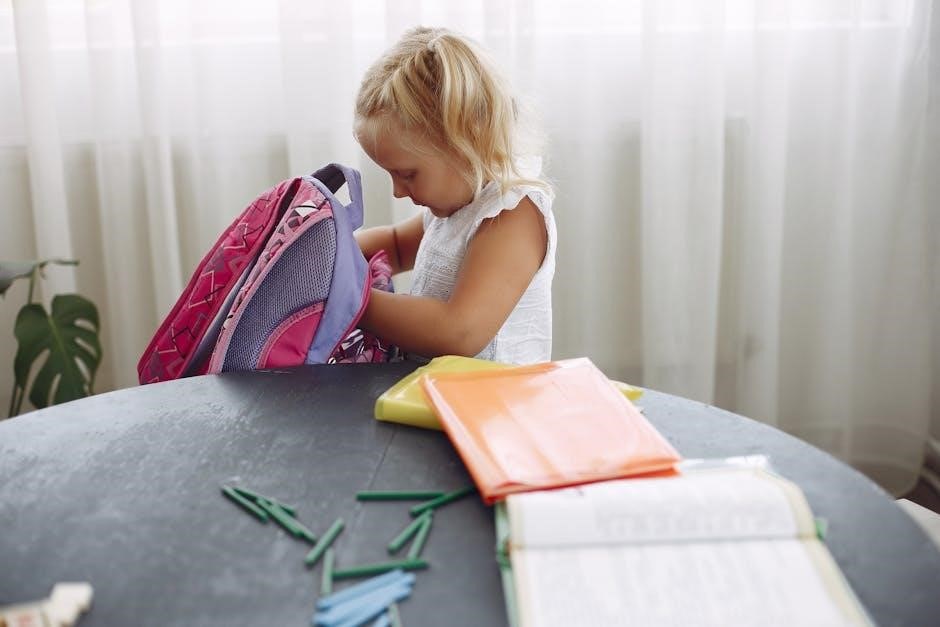
Popular Themes for Preschool Lesson Plans
Popular preschool themes include alphabet‚ phonics‚ color recognition‚ shapes‚ numbers‚ seasonal activities‚ holiday celebrations‚ and community helpers․ These themes engage young learners and promote foundational skills․
Alphabet and Phonics
Alphabet and phonics lessons are foundational for early literacy skills․ Preschool lesson plans often include activities like tracing letters‚ word games‚ and rhyming exercises to introduce the ABCs․ These exercises help children recognize letter shapes‚ sounds‚ and their relationships․ Interactive methods‚ such as singing alphabet songs or matching games‚ make learning engaging․ Phonics activities focus on blending sounds to form simple words‚ fostering reading readiness․ Worksheets‚ flashcards‚ and hands-on crafts reinforce these concepts․ By integrating play-based learning‚ teachers ensure young learners develop essential skills for spelling and reading․ These activities lay the groundwork for future academic success and a lifelong love of learning․
Color Recognition
Color recognition is a vital skill for preschoolers‚ enhancing cognitive and creative development․ Lesson plans often incorporate activities like color hunts‚ art projects‚ and sorting games to teach hues and their names․ These exercises help children identify and differentiate colors‚ fostering visual awareness and fine motor skills․ Interactive methods‚ such as painting or using colored blocks‚ make learning engaging․ Teachers also use flashcards‚ color-themed stories‚ and sensory bins to reinforce concepts․ Integrating color recognition into daily routines‚ like grouping toys by color‚ further solidifies learning․ These activities not only build foundational knowledge but also encourage creativity and problem-solving abilities in young learners․
Shape and Number Awareness
Shape and number awareness are fundamental skills for preschoolers‚ laying the groundwork for math and problem-solving abilities․ Lesson plans often include activities like shape sorting‚ counting games‚ and number tracing to introduce basic concepts․ Teachers use manipulatives‚ such as blocks and puzzles‚ to help children recognize and identify shapes like circles‚ squares‚ and triangles․ Number awareness is fostered through songs‚ rhymes‚ and interactive counting exercises․ These activities not only build mathematical foundations but also enhance logical thinking and hand-eye coordination․ By integrating these concepts into play-based learning‚ educators ensure a fun and effective approach to early math education․
Seasonal and Holiday Themes
Seasonal and holiday themes are a vibrant way to engage preschoolers in learning while celebrating cultural and festive traditions․ Lesson plans often incorporate activities like holiday crafts‚ storytelling‚ and themed games to foster excitement and curiosity․ For example‚ Christmas themes might include decorating trees or singing carols‚ while Halloween could involve costume-making and pumpkin carving․ These themes also provide opportunities to teach about patterns‚ colors‚ and social skills through festive activities․ By aligning seasonal themes with educational goals‚ teachers create a fun and meaningful learning environment that connects with children’s experiences and fosters a sense of community and cultural awareness․
Community Helpers
Community helpers themes introduce preschoolers to essential professions like doctors‚ teachers‚ and firefighters‚ fostering an understanding of their roles and importance․ Lessons often include role-playing‚ field trips‚ and storytelling to engage children․ Activities such as creating a “helper” dress-up corner or inviting guest speakers encourage curiosity and appreciation for these careers․ These themes also promote social skills‚ teamwork‚ and problem-solving‚ helping children connect with their community․ By exploring these roles‚ preschoolers develop empathy and a sense of responsibility‚ while learning about the contributions of different professionals in their daily lives․ This theme is both educational and engaging‚ making it a popular choice for young learners․
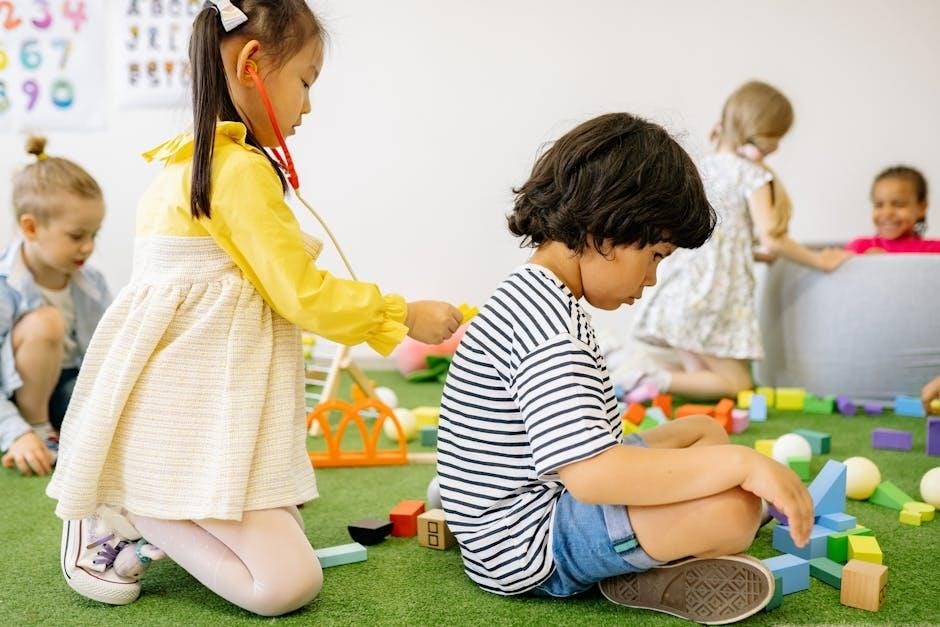
Tips for Creating Effective Preschool Lesson Plans
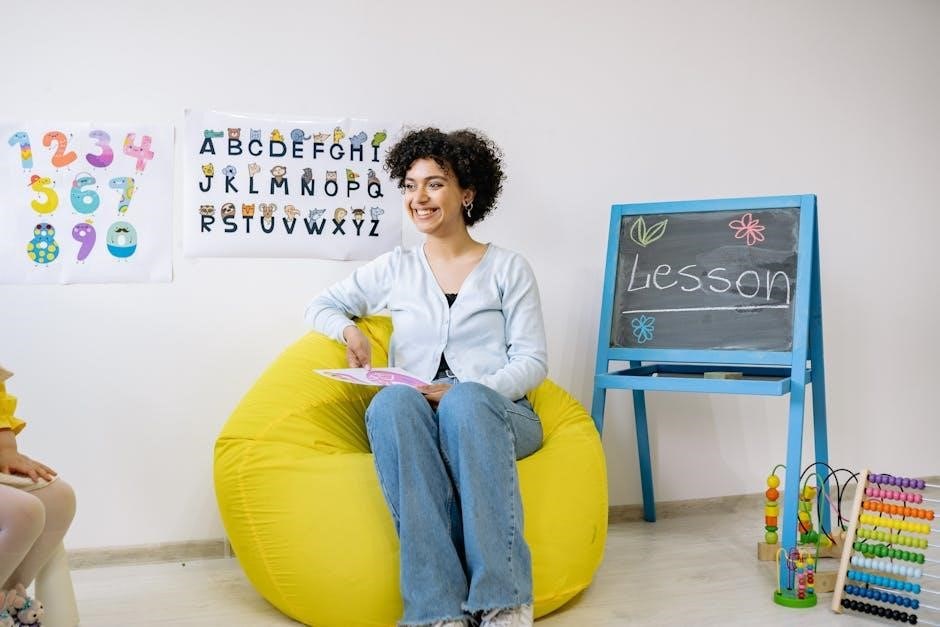
Tips for Creating Effective Preschool Lesson Plans
Ensure clear objectives‚ incorporate play-based learning‚ and use interactive activities․ Align plans with developmental milestones and include hands-on experiences to engage young learners effectively․
Aligning with Developmental Milestones
Preschool lesson plans should align with the cognitive‚ social‚ emotional‚ and physical developmental stages of children․ Understanding these milestones ensures activities are age-appropriate and foster growth․ Incorporate play-based learning to cater to natural curiosity and exploration․ Use sensory experiences‚ hands-on activities‚ and interactive games to promote skill development․ For example‚ sensory play enhances fine motor skills‚ while group activities encourage social interaction․ Ensure lesson plans are flexible to accommodate individual progress and diverse learning paces․ Observation and assessment tools help track development and adjust plans accordingly․ This approach creates a nurturing environment where children can thrive and reach their full potential․
Incorporating Play-Based Learning
Play-based learning is a cornerstone of effective preschool lesson plans‚ fostering creativity‚ curiosity‚ and skill development․ It allows children to explore and understand concepts naturally through hands-on experiences․ Activities like art projects‚ pretend play‚ and sensory exploration encourage imagination and problem-solving․ Incorporating play ensures learning is engaging and meaningful․ Teachers can integrate academic skills‚ such as counting or letter recognition‚ into playful activities․ This approach supports cognitive‚ social‚ and emotional growth while maintaining children’s intrinsic motivation to learn․ Play-based learning aligns with developmental milestones‚ making it a powerful tool for preparing young learners for future academic success․
Using Interactive and Hands-On Activities
Interactive and hands-on activities are essential for engaging preschoolers‚ making learning fun and effective․ These activities‚ such as art projects‚ science experiments‚ and manipulatives‚ encourage active participation and exploration․ They help children develop fine motor skills‚ problem-solving abilities‚ and social interaction․ Hands-on learning allows children to experience concepts firsthand‚ enhancing understanding and retention․ Activities like sorting games‚ role-playing‚ and sensory play cater to different learning styles and keep young learners motivated․ By incorporating interactive elements‚ teachers create a dynamic classroom environment that fosters curiosity and creativity‚ laying a strong foundation for future academic success․ These activities ensure learning is both enjoyable and meaningful for preschoolers․
Encouraging Parental Involvement
Encouraging parental involvement is crucial for a child’s educational journey․ Teachers can foster this by maintaining open communication through newsletters‚ parent-teacher conferences‚ and digital platforms․ Involving parents in classroom activities‚ such as reading sessions or art projects‚ creates a sense of community․ Providing parents with resources‚ like lesson plan PDFs‚ helps them support their child’s learning at home․ Encouraging families to participate in events or share cultural traditions enriches the classroom environment․ By making parents feel welcome and valued‚ teachers build a partnership that promotes a child’s academic and emotional growth‚ ensuring a strong foundation for future success․
Implementing Preschool Lesson Plans
Implementing preschool lesson plans involves creating a daily schedule‚ managing classroom behavior‚ and fostering a positive learning environment to ensure effective teaching and engagement of young learners․
Creating a Daily Schedule
A daily schedule is essential for organizing preschool activities‚ ensuring a balance between structured learning and play․ It typically includes arrival routines‚ circle time‚ play-based learning‚ snacks‚ outdoor play‚ and quiet time․ Activities like art projects‚ storytime‚ and music sessions are also scheduled to promote creativity and engagement․ Transition times are planned to help children adapt smoothly between tasks․ A well-structured schedule supports academic and social development while fostering emotional growth․ Flexibility is key to accommodate diverse needs and unexpected events․ Consistency in routines helps children feel secure and builds a sense of predictability‚ which is crucial for young learners․
Managing Classroom Behavior
Managing classroom behavior in preschool involves creating a positive and respectful environment․ Clear expectations and consistent routines help children understand boundaries․ Positive reinforcement‚ such as praise or stickers‚ encourages good behavior․ Redirecting children during transitions or challenging moments minimizes disruptions․ Teaching social skills like sharing and using “I statements” fosters empathy and cooperation․ Natural consequences‚ such as cleaning up spills‚ help children take responsibility․ Teachers should model calm and patient behavior‚ even in difficult situations․ A well-managed classroom promotes emotional growth and allows children to focus on learning․ Consistency and adaptability are key to meeting the unique needs of each child and ensuring a smooth daily routine․
Fostering a Positive Learning Environment
Fostering a positive learning environment in preschool involves creating a welcoming and inclusive space that encourages exploration and growth․ Organizing the classroom with developmentally appropriate materials and clear zones for play‚ art‚ and reading helps children feel secure․ Incorporating themes that reflect their interests and cultures builds a sense of belonging․ Teachers should encourage kindness‚ respect‚ and collaboration among students through group activities and positive reinforcement․ Using interactive and hands-on resources‚ such as puzzles‚ blocks‚ and art supplies‚ stimulates curiosity and creativity․ A warm and supportive atmosphere helps children develop confidence and a love for learning‚ laying the foundation for future academic success and social development․
Evaluating Lesson Plan Effectiveness
Evaluating the effectiveness of preschool lesson plans involves assessing whether they meet their intended learning objectives and support child development․ Observing children’s participation and engagement during activities provides insights into the relevance and appeal of the content․ Reviewing learning outcomes‚ such as improved skills or knowledge retention‚ helps determine if goals are being achieved․ Feedback from teachers and parents can also highlight strengths and areas for improvement․ Reflecting on the structure of the lesson‚ including the introduction‚ activities‚ and closure‚ helps identify what worked well and what could be adjusted․ Positive feedback from children‚ such as excitement about learning‚ is a strong indicator of success․ Continuous evaluation ensures that lesson plans remain effective and adaptable to the needs of young learners․
Preschool lesson plans are vital tools for guiding young learners‚ ensuring engaging and effective education that nurtures their skills‚ curiosity‚ and overall development․
Final Thoughts on Preschool Lesson Plans
Preschool lesson plans are essential tools for guiding young learners through engaging and developmentally appropriate activities․ They provide structure‚ ensuring children are prepared for future academic and social challenges․ By incorporating play-based learning‚ hands-on experiences‚ and creative activities‚ these plans foster curiosity‚ creativity‚ and critical thinking․ Effective lesson plans also promote emotional and social growth‚ helping children build resilience and adaptability․ Teachers should remain flexible‚ adapting plans to meet the unique needs of their students․ Ultimately‚ preschool lesson plans create a nurturing environment that encourages a lifelong love of learning and equips children with the skills needed for success․
Encouragement for Teachers
Teaching preschool is a rewarding journey that shapes young minds․ Embrace the opportunity to create engaging lesson plans that foster creativity and curiosity․ Remember‚ your dedication lays the foundation for lifelong learning․ Utilize available resources‚ like preschool lesson plan PDFs‚ to streamline preparation and ensure activities align with developmental milestones․ Stay flexible and adapt plans to meet your students’ unique needs․ Celebrate small successes and nurture a love for learning in your classroom․ Your efforts inspire growth‚ resilience‚ and a positive outlook on education․ Keep exploring new strategies and collaborating with peers to enhance your teaching practices and create meaningful experiences for your students․